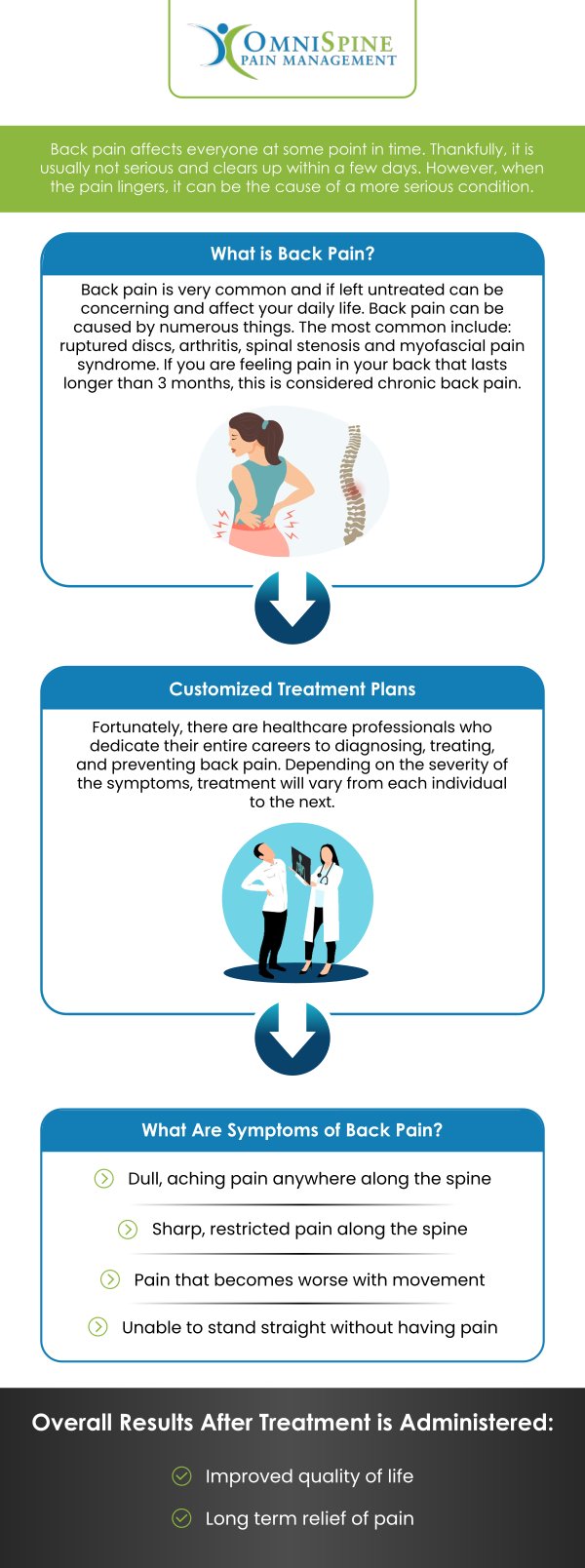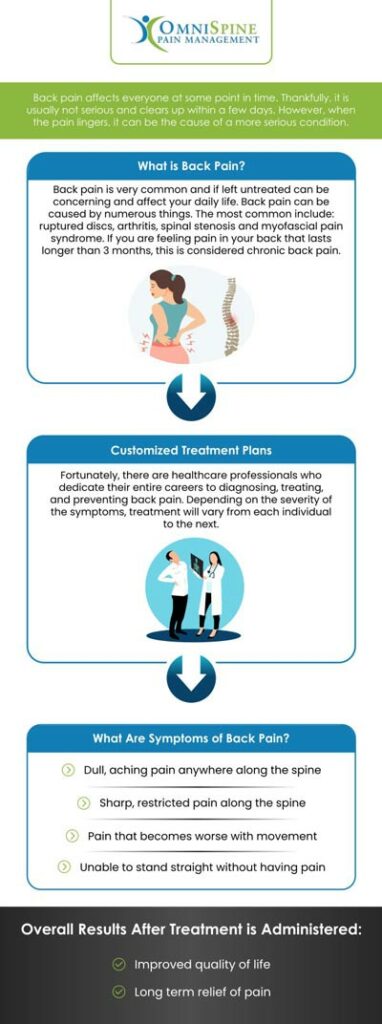What Can a Pain Management Doctor Do for Back Pain?
Pain management professionals have specific expertise in evaluating, diagnosing, treating, and preventing a wide range of pain. These highly qualified specialists not only diagnose diseases but also organize treatment and offer pain patients with continuing care. If you are struggling with back pain visit Dr. Andrew Morchower at OmniSpine Pain Management. For more information, contact us or book an appointment online. Our clinics are located in Frisco, TX, Sunnyvale, TX, and Mesquite, TX.




Table of Contents:
What can a doctor do for back pain?
How can you tell if your back pain is serious?
How can you tell if back pain is muscular or caused by something else?
Pain management doctors can offer a range of treatments and therapeutic interventions for back pain. The best option will depend on the specific cause and severity of the pain. To support back health, physicians can provide advice on lifestyle changes, such as weight management strategies and helpful exercises. These experts can also coach you on techniques for better posture to reduce the risk of future pain.
Additionally, pain management professionals can prescribe pain relievers or muscle relaxants to manage persistent discomfort. Along with medication, there is a wide variety of back pain treatments offered at our clinic. The options range from physical therapy to fluoroscopic-guided spinal injections and spinal cord stimulation therapy.
In some cases, pain management doctors will recommend trigger point injections or nerve blocks to reduce inflammation and pain. These approaches are advantageous as they provide relief for weeks to months. Surgery is typically a last resort for back pain when conservative treatments are ineffective. Spinal surgery is used to correct issues such as herniated discs or spinal stenosis.
Determining whether regular back pain or a more serious issue is affecting you requires the expertise of a doctor. Several signs indicate that your pain may be serious and requires prompt medical attention, including:
• Trauma or accident – Back pain following an accident, fall, or other traumatic event should always be evaluated by a healthcare professional, as it could be due to a spinal fracture or other serious injury.
• Severe, unrelenting pain – If the pain is intense, constant, or worsening over time, it can indicate a more serious issue, such as a herniated disc.
• Numbness or tingling – If you experience numbness or tingling in the back, arms, or legs, it can be caused by nerve compression or another serious issue.
• Pain radiating down the leg – Back pain that shoots down one or both legs is a common sign of sciatica, which is a condition often caused by compression of the sciatic nerve. Sciatica results in weakness and numbness in the leg and requires medical evaluation.
• Fever with back pain – A fever accompanying back pain can be a sign of an infection in the spine. Infections can cause severe complications if not treated promptly.
• Persistent pain in older adults – In older adults, persistent back pain can be a sign of conditions such as osteoporosis or spinal fractures due to bone weakening.
If you notice any of these signs or are uncertain about the cause of your back pain, it’s best to seek medical advice. Furthermore, people with a history of cancer, osteoporosis, or recent spinal surgeries should be vigilant about any new or worsening back pain.
Muscular back pain is often described as a dull ache. It may be localized to a specific area of the back or radiate to nearby muscles. It typically doesn’t cause a sharp or shooting sensation. Additionally, muscular pain is often linked to physical activity. You may notice it after lifting heavy objects, exercising, or engaging in activities that strain your back muscles. Aside from muscular pain, there are other common causes of back pain, including:
• Inflammation – Conditions like inflammatory arthritis can lead to persistent back pain and stiffness.
• Infection – Spinal infections can cause severe back pain and are often characterized by a fever and worsening symptoms.
• Organ-related pain – Kidney infections or stones, pancreatitis, and certain gastrointestinal issues can cause referred pain in the back.
• Nerve-related pain – Herniated discs, sciatica, and spinal stenosis can cause pain that radiates down the leg, often along with sensations of tingling, numbness, or weakness.
In many cases, if the pain is caused by muscular issues, it can be managed with rest, physical therapy, over-the-counter pain medications, and lifestyle adjustments. However, for unexplainable pain or discomfort accompanied by concerning symptoms, seeking medical attention is highly recommended. For more information, contact us or book an appointment online. Our clinics are located in Frisco, TX, Sunnyvale, TX, and Mesquite, TX. We serve patients from Dallas TX, Frisco TX, Mesquite TX, Sunnyvale TX, Plano TX, Garland TX, Forney TX, Cedar Hill TX, Denton TX, Balch Springs TX, and surrounding areas.
Check Out Our 5 Star Reviews






